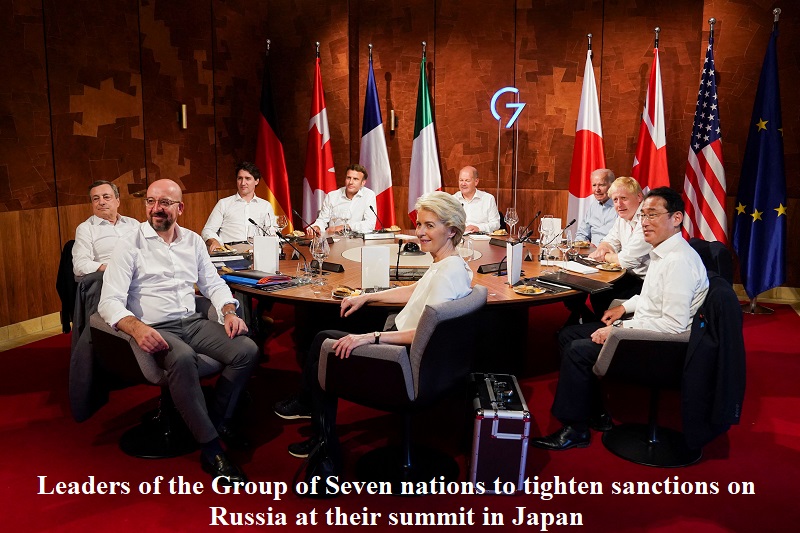
Leaders of the Group of Seven (G7) nations are planning to impose stricter sanctions on Russia during their summit in Japan, focusing on energy and exports that support Moscow’s war efforts, according to officials familiar with the discussions.
The new measures to be announced during the May 19-21 meetings will target sanctions evasion involving third countries and aim to undermine Russia’s future energy production while curbing trade that supports its military activities.
Additionally, US officials anticipate that G7 members will agree to adjust their approach to sanctions, automatically banning all exports unless they are on a list of approved items for certain categories of goods.
Previously, the Biden administration urged G7 allies to revise the group’s sanctions approach, which currently allows all goods to be sold to Russia unless explicitly blacklisted. This change could make it more challenging for Moscow to exploit loopholes in the sanctions regime.
While the more-restrictive approach may not be applied broadly, US officials expect G7 members to adopt a presumption that exports are banned unless included on a designated list in the most sensitive areas concerning Russia’s military. The specific areas where these new rules will be implemented are still under discussion.
According to an unnamed US official, the upcoming change in presumption is expected to occur in a few areas, particularly those related to Russia’s defense industrial base.
The precise language of the joint declarations by G7 leaders is still subject to negotiation and adjustment before its release during the summit. The G7 consists of the United States, Japan, Canada, France, Germany, Italy, and the United Kingdom.
The G7 leaders’ actions regarding Russia come as Ukraine’s Western allies search for new ways to tighten existing sanctions, including export controls, visa restrictions, and an oil price cap. Despite these measures, which have exerted pressure on Russian President Vladimir Putin, they have not halted the ongoing full-scale invasion of Ukraine.
Some US allies have expressed resistance to a broad trade ban followed by category-specific exemptions. The European Union, for instance, follows its own approach and is currently negotiating its 11th package of sanctions against Russia, primarily targeting individuals and countries circumventing existing trade restrictions.
A senior German government official stated that the approach of banning everything first and then granting exceptions is not viable, as precision and the avoidance of unintended side effects are paramount.
It should be noted that any change in language, including specifications that certain trades are banned unless specifically exempted, by the G7 leaders may not result in immediate bans or a shift in Russia’s stance.
Ukraine, backed by Western support, is expected to launch major counter-offensive operations in the near future to reclaim territories in its east and south currently occupied by Russian forces. Ukrainian President Volodymyr Zelenskiy has been in Europe this week, meeting with Pope Francis and leaders from France, Italy, and Germany. He is anticipated to address the G7 leaders, either virtually or in-person, during the summit in Hiroshima.
Former Russian President Dmitry Medvedev warned last month that a G7 decision to ban exports to Russia would lead Moscow to terminate a Black Sea grain deal facilitating crucial grain exports from Ukraine. Food security in the aftermath of the conflict is also expected to be a major topic of discussion at the G7 summit.

Post Your Comments